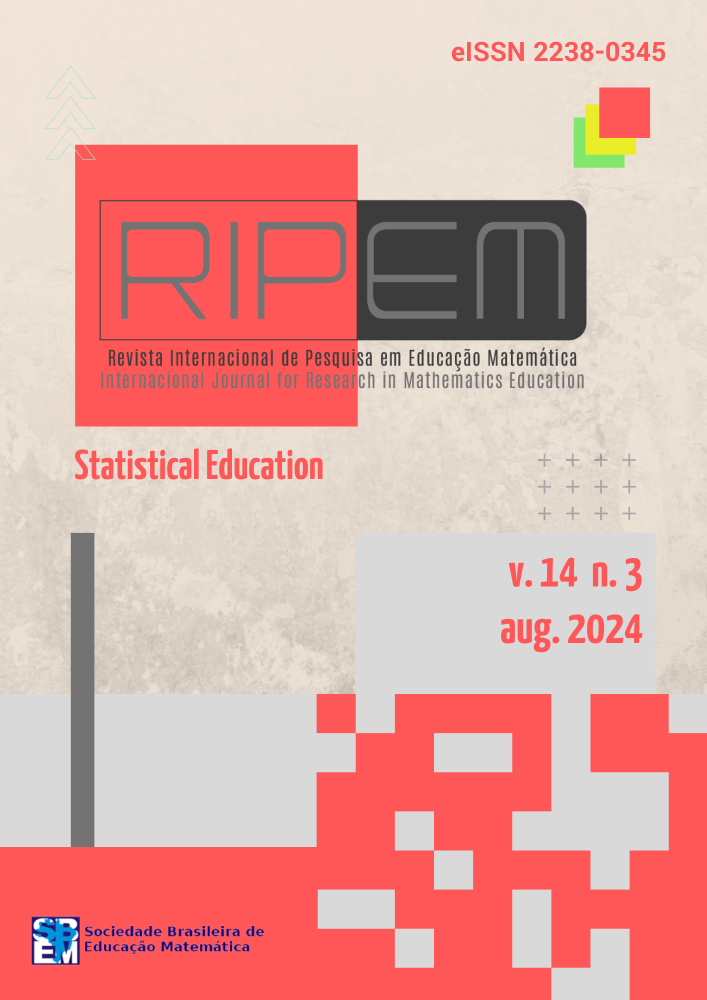Technological choices in Statistics: reflections on pedagogical practices in the Brazilian higher education
DOI:
https://doi.org/10.37001/ripem.v14i3.3805Palavras-chave:
Statistics Education, Digital Technologies, Professors’ Education Processes, Statistical Literacy, TPACKResumo
Our study analyzed the integration of digital technologies into Statistics teaching by exploring professors’ perceptions and practices in the Brazilian context. We investigated educators’ technological choices through descriptive statistical techniques and multivariate analysis, highlighting the relation among professors’ Education processes, pedagogical practices and the use of digital technologies. Our results, which showed the influence of professors’ Education processes on their technological choices, were discussed in the light of statistical literacy and the TPACK model. The study points out the crucial role of professors’ Education processes in critical and intentional integration of technology into teaching and provides valuable reflections on contemporary Statistics Education in Brazilian Higher Education.
Downloads
Referências
Ainley, J.; Gould, R. & Pratt, D. (2015). Learning to reason from samples: Commentary from the perspectives of task design and the emergence of “big data”. Educational Studies in Mathematics, 88(3), 405-412.
American Statistical Association. (2014). Curriculum Guidelines for Undergraduate Programs in Statistical Science. Alexandria, VA.
Batanero, C. (2000). ¿Hacia Dónde Va La Educación Estadística? Blaix, 15, 2-13.
Batanero, C. (2019). Thirty years of stochastics education research: Reflections and challenges. In: Tercer Congreso Internacional Virtual de Educación Estadística (pp. 1-15). Granada, Spain.
Ben-Zvi, D.; Gravemeijer, K. & Ainley, J. (2019). Design of statistics learning environments. In: Eleventh Congress of the European Society for Research in Mathematics Education (CERME11) (pp. 1-10). Utrecht, Netherlands.
Bertoncelo, E. R. E. (2022). Construindo espaços relacionais com a análise de correspondências múltiplas: aplicações nas ciências sociais. Brasília, DF: ENAP.
Biehler, R. (1990). Changing conceptions of statistics: A problem area for teacher education. In: International Statistical Institute Round Table Conference (pp. 20-38). Voorburg.
Carver, R.; Everson, M.; Gabrosek, J.; Horton, N.; Lock, R.; Mocko, M.; Rossman, A.; Roswell, G.; Velleman, P.; Witmer, J. & Wood, B. (2016). Guidelines for Assessment and Instruction in Statistics Education (GAISE) College Report 2016.
Filatro, A. & Cavalcanti, C. C. (2018). Metodologias Inov-Ativas na educação presencial, a distância e corporativa. São Paulo, SP: Saraiva Uni.
Freitas, M. T. (2010). Letramento digital e formação de professores. Educação em Revista, 26, 335-352.
Gal, I. (2002). Adults’ Statistical Literacy: Meanings, Components, Responsibilities. International Statistical Review / Revue Internationale de Statistique, 70(1), 1-25.
Gal, I. (2019). Understanding statistical literacy: About knowledge of contexts and models. In: Tercer Congreso Internacional Virtual de Educación Estadística (pp. 1-15). Granada, Spain.
Garfield, J. B.; Ben-Zvi, D.; Chance, B.; Medina, E.; Roseth, C. & Zieffler, A. (2008). Developing Students’ Statistical Reasoning. Dordrecht: Springer.
Gomes, E. G. S.; André, R. C. M. & Morais, M. D. (2023). O uso de tecnologias digitais da informação e comunicação fomentando o letramento matemático na formação de professores de Matemática dos Anos Iniciais. Revista Internacional de Pesquisa em Educação Matemática, 13(1), 1-20.
Gomes, E. G. S. & Carvalho, A. B. (2020). As estratégias dos docentes com o uso de tecnologias digitais no contexto pandêmico da Covid-19. Em Teia, 11(2), 1-18.
Gould, R. (2012). Preface To The Proceedings Of The 2012 Iase Roundtable On Technology And Statistics Education. In: Technology in Statistics Education: Virtualities and Realities (pp. 1-3). Cebu.
Gould, R. (2021). Toward data-scientific thinking. Teaching Statistics, 43(S1), 11-22.
Hastie, T.; Friedman, J. & Tibshirani, R. (2001). The Elements of Statistical Learning. New York: Springer.
Husson, F.; Le, S. & Pagès, J. (2017). Exploratory Multivariate Analysis by Example Using R. London, UK: CRC Press.
Koehler, M. & Mishra, P. (2009). What is Technological Pedagogical Content Knowledge (TPACK)? Contemporary Issues in Technology and Teacher Education, 9(1), 60-70.
Lankshear, C. & Knobel, M. (2008). Digital Literacies: Concepts, Policies and Practices (v. 30). New York, NY: Peter Lang.
Lê, S.; Josse, J. & Husson, F. (2008). FactoMineR: An R Package for Multivariate Analysis. Journal of Statistical Software, 25, 1-18.
List, A.; Brante, E. W. & Klee, H. L. (2020). A framework of pre-service teachers’ conceptions about digital literacy: Comparing the United States and Sweden. Computers & Education, 148, 1-20.
Magalhães, M. N. (2014). Challenges For Learning About Distributions In Courses For Future Mathematics Teachers. In: 9th International Conference on Teaching Statistics (pp. 1-6). Flagstaff.
McNamara, A. (2018). Imagining the future of statistical education software. In: 10th International Conference on Teaching Statistics (pp. 1-3). Kyoto, Japan.
Mishra, P. & Koehler, M. J. (2006). Technological Pedagogical Content Knowledge: A Framework for Teacher Knowledge. Teachers College Record: The Voice of Scholarship in Education, 108(3), 1017-1054.
Moore, D. S. (1992). What is Statistics. In: Hoaglin, D. C. (Org.). Perspectives on contemporary statistics. (v. 21, pp. 1-17). Washington: Mathematical Association of America.
Pretto, N. D. L.; Bonilla, M. H. S. & Sena, I. P. F. S. (2020). Educação em tempos de pandemia: Reflexões sobre as implicações do isolamento físico imposto pela COVID-19. Salvador: Edição do Autor.
Shulman, L. S. (1986). Those Who Understand: Knowledge Growth in Teaching. Educational Researcher, 15(2), 4-14.
Shulman, L. S. (1987). Knowledge and Teaching: Foundations of the New Reform. Harvard Educational Review, 57(1), 1-23.
Tardif, M. (2013). A profissionalização do ensino passados trinta anos: Dois passos para a frente, três para trás. Educação & Sociedade, 34(123), 551-571.
Tardif, M. (2014). Saberes docentes e formação profissional (17. ed). Petrópolis, RJ: Vozes.
Wasserman, L. (2004). All of Statistics: A Concise Course in Statistical Inference. New York: Springer.
Publicado
Como Citar
Edição
Seção

Este trabalho está licensiado sob uma licença Creative Commons Attribution-NonCommercial-ShareAlike 4.0 International License.








